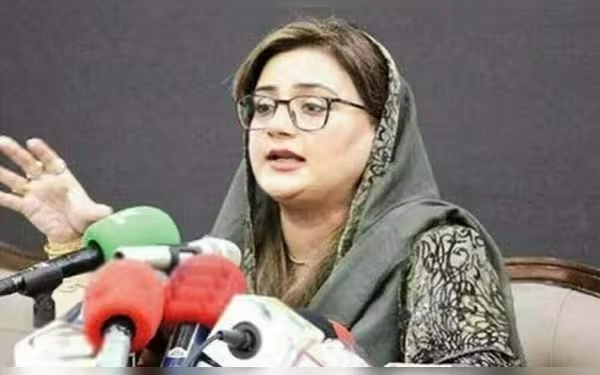Saturday, November 16, 2024 07:32 PM
Azma Bokhari Critiques PTI's Political Tactics and Protests
- Azma Bokhari criticizes PTI's chaotic political origins.
- She accuses the 'Fitna Group' of hypocrisy and corruption.
- Bokhari emphasizes the need for constructive political dialogue.
 Image Credits: urdupoint
Image Credits: urdupointAzma Bokhari critiques PTI's origins in protests, accusing the 'Fitna Group' of hypocrisy and urging for constructive political dialogue.
In recent political discourse, Punjab Information Minister Azma Bokhari has made significant remarks regarding the origins and current state of the Pakistan Tehreek-e-Insaf (PTI). She emphasized that the party's political journey began with protests, sit-ins, and rallies, which she described as chaotic. This assertion highlights the tumultuous nature of PTI's rise in Pakistan's political landscape.
Bokhari pointed out that the prosperity returning to Pakistan is being rejected by what she termed the "Fitna Group." She accused this group of hypocrisy, stating that those who previously labeled others as "thieves" are now facing allegations of corruption within their own families. This statement underscores the ongoing political rivalry and the accusations that often fly between opposing parties in Pakistan.
Furthermore, the Information Minister elaborated on the role of the "umpire’s finger" and the conspiratorial actions that she claims have been pivotal in PTI's political ascent. She criticized the party for allegedly dragging the youth into a quest for power while their leaders enjoy a lavish lifestyle abroad, particularly in London. This critique reflects a broader concern about the disconnect between political leaders and the everyday lives of citizens.
Bokhari did not hold back in her criticism of PTI's current political tactics, suggesting that their approach has deteriorated to a level lower than street politics. She referenced a past statement by Nawaz Sharif, saying, "We will build roads, and you will just measure them," to illustrate her point that PTI is not accepting the developmental progress being made in Punjab.
She praised Maryam Nawaz for her efforts in implementing relief packages and development projects across various sectors in Punjab, asserting that these initiatives are historic and revolutionary. This acknowledgment of rival party efforts indicates a recognition of the importance of development in political discourse.
Moreover, Bokhari characterized the political life of PTI's founder as revolving around "Dheel" and Deal, suggesting a focus on negotiations rather than genuine political engagement. She expressed concern that the "Fitna Group" is fixated on protests, indicating a lack of constructive political dialogue.
In her concluding remarks, Bokhari asserted that political figures should engage in meaningful political struggles rather than resorting to tactics that undermine the federation. She made it clear that any attempts to disrupt public order under the guise of peaceful protests would not be tolerated, promising strict action against those who break the law or instill fear among citizens.
In summary, Azma Bokhari's statements reflect the ongoing tensions in Pakistan's political arena, where accusations and counter-accusations are commonplace. As the political landscape continues to evolve, it remains crucial for all parties to prioritize constructive dialogue and the welfare of the citizens they represent. The future of Pakistan's democracy may well depend on the ability of its leaders to rise above personal grievances and work collaboratively for the nation's progress.













